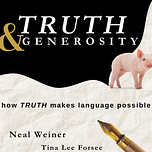Why do we have to keep changing which words we use?
We used to say handicapped and homeless, but now we’re supposed to say differently abled and person experiencing homelessness—actually, I’ve been told the latter is now frowned upon. As usual, I’m behind the times.
I’m guessing the mere mention of this sort of semantic tinkering has you thinking of what’s happening these days on college campuses, the attempts to correct the way we refer to people being only one of many social justice controversies. Of course, political euphemisms don’t come exclusively from the left; let’s not forget Trump’s truthful hyperbole and Kellyanne Conway’s alternative facts.
On the other hand, such doublespeak fails precisely because it’s so laughably blatantly obvious. Successful changes to language are much harder to spot. Remember when we used to talk about global warming? That phrase fell out of favor when Republicans were advised to start using the less dire-sounding climate change.
Fast forward to today: climate change sounds pretty dang apocalyptic, regardless of what political side you’re on.
Welcome to the euphemism treadmill.
John McWhorter talks about this phenomenon in an Aeon article, “…in a linguistically mature society, we should expect that the terms we introduce to help us kick off new ways of thinking will require periodic replacement, like tyres.” Semantic change is constant and inevitable. Words change meaning, that’s what they do.
But what does it take to make a political euphemism go mainstream?
Wouldn’t you like to know. ;)
Sure, being filthy rich and insanely popular certainly helps, but it isn’t enough. And belonging to an extremely powerful political group is no guarantee either. As McWhorter explains in this YouTube video, there’s a simple reason why some proposals (Latinx, for example) never get off the ground—the public isn’t conceptually prepared to accept the change. In other words, if you want people to change the way people talk, you have to change the way they think. This goes back to what we’ve been saying all along in Truth & Generosity—by and large it’s thought that shapes language, not the other way around.
But if that’s the case, then why is this notion that we can harness the power of language to sway public opinion perennially tantalizing? Why do we buy into the 1984 horror scenario that one day, we, too, could believe “War is Peace”? Is it simply because we don’t understand how language works, or is something more going on here?
The next few chapters of Truth & Generosity coincide with many of the points McWhorter makes, but they also take a philosophical dive into the underlying mechanisms that power the euphemism treadmill and semantic change in general. The rest of the book is an exploration of the greater implications that can be drawn from these observations—kind of like an expansive thought experiment on the origin of language, the nature of truth, and intelligibility of the universe.
—Tina
Notes:
Don’t forget, you can customize which bits of the newsletter you receive by visiting your account at any time—if you don’t want to see the previews of these posts, deselect “Truth and Generosity”. My regular posts will continue to be free.
Table of contents with chapter links at the end of each post.
5
Etymology and Truth
WORDS HAVE HISTORIES; this is an indisputable fact. What is less certain are the principles that govern their changes over time.
Etymology, a specialty in the study of linguistics, is the study of the history of words. It involves three closely interwoven tasks: to accurately describe the historical sequence of semantic shifts, establish a typology of them, and determine the causal mechanism through which they occur. The vast bulk of linguistic research in this area has concerned the first point and consists of laying out particular etymologies through careful, empirical study. In close connection to this is the effort to classify semantic change and to speculate about the possibility of a semantic shift analogous to established patterns of phonetic drift. Inquires into the underlying cause of semantic change, when they occur, tend to focus on agents of change: social subgroups, power relations, foreign language influence, similar sound confusions, and so on. The philosophical question I am asking which concerns the general intellectual mechanism through which all these more specific causes operate has not, to my knowledge, been addressed, at least not in much detail. Consequently, the notions of semantic tension and truth stress tests, which we will turn to here, are not part of current linguistics, nor to my knowledge have they been developed anywhere else. But the rich empirical work of historical linguistics can be used to illustrate, clarify, and reinforce them.
Prefer paperbacks but don’t want to miss out on the discussion? Just let me know you’re reading along (I trust you) and I’ll pull back the paywall curtain for you. :)
Listen to this episode with a 7-day free trial
Subscribe to Philosophy and Fiction to listen to this post and get 7 days of free access to the full post archives.






